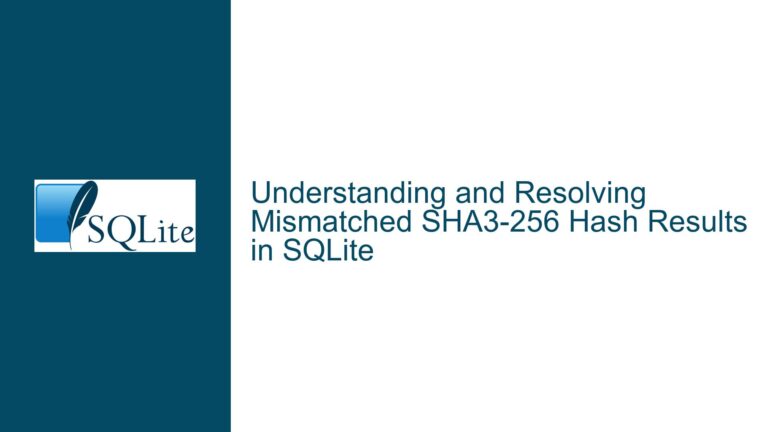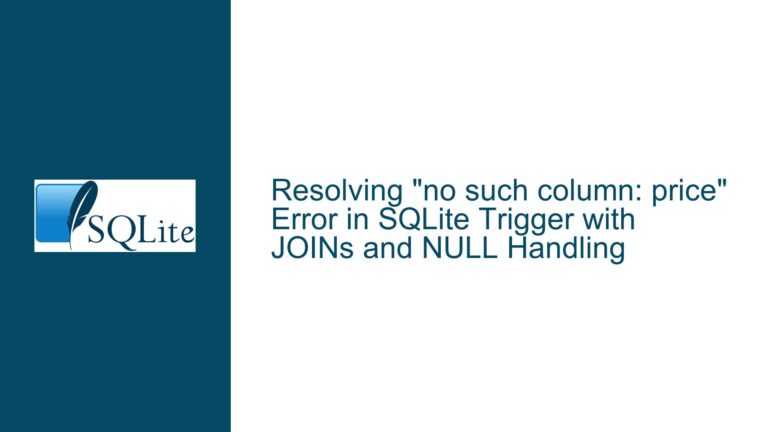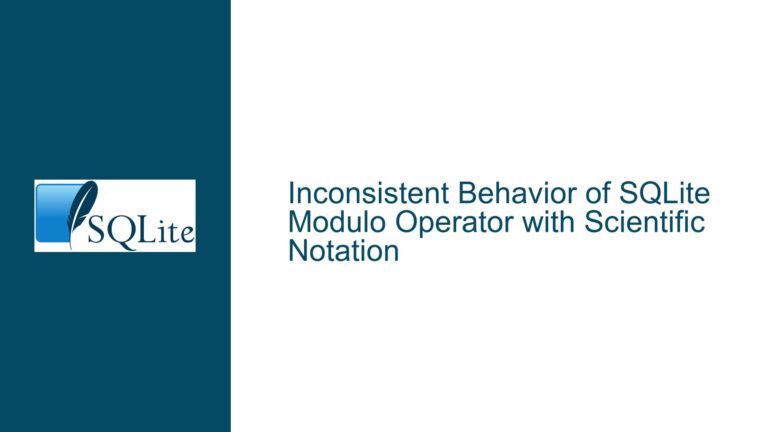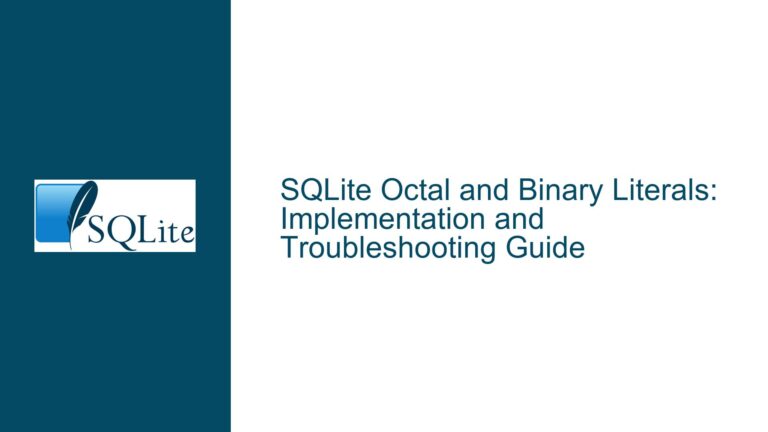Unexpected Backup Table Searches During Hashes Insertion with Foreign Key Constraints
Foreign Key Constraint Checks Triggering Backup Table Scans During Hash Insertion
Issue Overview: Unanticipated Backup Table Involvement in Hash Insert Operations
The core challenge involves an unexpected performance degradation during insertion operations into a primary hashes table, accompanied by query plan evidence of searches occurring on a backup table that references the hashes table via foreign key constraints. This occurs despite the absence of direct operational relationships between the insertion logic and the backup table in the schema definition.
Schema Context:
- hashes: Primary table storing object hash values with columns (id INTEGER PRIMARY KEY, hash BLOB, type INTEGER)
- backup: Child table containing backup metadata with foreign key reference to hashes.id (FOREIGN KEY (id) REFERENCES hashes(id) ON DELETE CASCADE)
- hash_upd: Temporary staging table used to batch-process hash updates
- object_hashes: Junction table with its own foreign key to hashes.id (FOREIGN KEY (hash_id) REFERENCES hashes(id))
Operational Symptoms:
- The
INSERToperation into hashes uses a complex query involving a CTE, temporary tables, and anti-join logic to prevent duplicates. EXPLAIN QUERY PLANoutput reveals SEARCH operations on backup and object_hashes during insertion into hashes, which are not explicitly referenced in the insertion query.- Performance metrics indicate latency spikes correlated with these searches, particularly when handling large batch inserts.
Key Mechanistic Observations:
- Foreign Key Enforcement Overhead: SQLite automatically validates foreign key integrity for non-deferred constraints during write operations. While backup references hashes, inserts into hashes should theoretically not require checking backup, as the foreign key is a one-way parent-child relationship.
- Trigger-Induced Validation: Implicit validation may occur if schema triggers (e.g.,
AFTER INSERTon hashes) interact with tables that have foreign key dependencies. - Temporary Table Isolation: The use of
temp.hash_updeliminates direct schema-level foreign key linkages to permanent tables, ruling out basic constraint violations from the staging data.
Root Cause Hypothesis:
The unexpected backup table searches stem from SQLite’s foreign key integrity verification routines under specific constraint violation scenarios. When existing rows in backup or object_hashes reference invalid hashes.id values (orphaned records), SQLite proactively checks these tables during hashes insertion to preempt constraint violations. This is compounded by the use of immediate foreign key constraints (non-deferred) and the absence of covering indexes optimized for reverse lookups.
Foreign Key Validation Logic and Constraint Violation Detection
Possible Causes: Why Backup Table Scans Occur on Hashes Insertion
1. Orphaned Rows in Foreign Key-Dependent Tables
Existing rows in backup or object_hashes with id/hash_id values not present in hashes.id create unresolved foreign key violations. SQLite’s constraint checker evaluates these during hashes insertion to determine if the new id values resolve existing violations, triggering scans of dependent tables.
2. Non-Deferred Foreign Key Constraints
The FOREIGN KEY (id) REFERENCES hashes(id) clause in backup uses immediate enforcement (default in SQLite). This forces validation during the hashes insert transaction phase, not at commit time. If the transaction history includes operations that could affect constraint validity (e.g., prior failed inserts into backup), the engine re-validates all relevant constraints.
3. Trigger Logic with Side Effects
Triggers attached to hashes (e.g., AFTER INSERT) that modify backup or object_hashes force foreign key checks during the insertion workflow. Even if no triggers exist, SQLite’s internal FK validation may scan child tables to ensure no dangling references preemptively.
4. Query Planner Misinterpretation of Anti-Join Conditions
The NOT EXISTS(SELECT 1 FROM hashes WHERE hashes.hash=hash_upd.hash) anti-join might inadvertently influence the query optimizer to consider foreign key indexes on related tables, especially if statistics indicate overlapping value ranges between hashes.hash and backup.bkhash.
5. Indexing Gaps in Foreign Key Relationships
The absence of covering indexes on backup.id or object_hashes.hash_id forces SQLite to perform full-table scans (manifesting as SEARCH in query plans) when validating constraints, despite the presence of primary key indexes.
6. VDBE Bytecode Execution Artifacts
As noted in the discussion, the EXPLAIN QUERY PLAN output abstracts low-level Virtual Database Engine (VDBE) operations. The SEARCH backup step may correspond to an FkIfZero instruction that skips unnecessary checks unless constraint violations exist. This creates an illusion of persistent backup table involvement when the scan is conditional.
Eliminating Redundant Foreign Key Scans During Insert Operations
Troubleshooting Steps, Solutions & Fixes
Step 1: Identify Existing Foreign Key Violations
Run a foreign key integrity check to detect orphaned records in backup and object_hashes:
PRAGMA foreign_key_check;
- If violations exist:
- Delete orphaned rows:
DELETE FROM backup WHERE id NOT IN (SELECT id FROM hashes); DELETE FROM object_hashes WHERE hash_id NOT IN (SELECT id FROM hashes); - Enable
PRAGMA foreign_keys=ON(if not already active) to prevent future violations.
- Delete orphaned rows:
Step 2: Audit and Optimize Indexes on Foreign Key Columns
Ensure covering indexes exist on foreign key columns in child tables to accelerate constraint validation:
CREATE INDEX IF NOT EXISTS backup_id_fk ON backup(id);
CREATE INDEX IF NOT EXISTS object_hashes_hash_id_fk ON object_hashes(hash_id);
- Rationale: Foreign key checks on child tables require efficient lookups against parent table keys. Indexes prevent full-table scans during validation.
Step 3: Analyze Trigger Dependencies
List all triggers associated with hashes to identify indirect interactions with backup:
SELECT sql FROM sqlite_master WHERE type = 'trigger' AND tbl_name = 'hashes';
- If triggers modify backup:
- Refactor trigger logic to batch operations or defer foreign key checks using
PRAGMA defer_foreign_keys=ON.
- Refactor trigger logic to batch operations or defer foreign key checks using
Step 4: Defer Foreign Key Validation
Convert immediate foreign key constraints to deferred where applicable:
-- Recreate backup table with deferred constraints (not supported in SQLite; workaround below)
PRAGMA defer_foreign_keys = ON;
- Limitation: SQLite does not support
DEFERRABLEclauses in table definitions. Instead, wrap insert operations in transactions with explicit deferral:BEGIN; PRAGMA defer_foreign_keys = ON; -- Execute insert into hashes COMMIT;
Step 5: Rewrite the Insert Query to Minimize Constraint Checks
Modify the INSERT statement to reduce optimizer ambiguity:
WITH src(obj_id) AS (VALUES (?))
INSERT INTO hashes (hash, type)
SELECT hash, type FROM (
SELECT DISTINCT hash_upd.hash, hash_upd.type
FROM src
JOIN hash_upd ON hash_upd.oid=src.obj_id
JOIN hash_types ht ON ht.id=hash_upd.type AND ht.name NOT IN ('block')
WHERE LENGTH(hash_upd.hash) > 0
EXCEPT
SELECT hash, type FROM hashes
) AS new_hashes;
- Improvements:
- Replace
NOT EXISTSwithEXCEPTto clarify intent and avoid correlated subqueries. - Force materialization of distinct hashes before insertion.
- Replace
Step 6: Utilize Temporary Tables for Batch Processing
Offload intermediate results to in-memory tables to reduce disk I/O:
ATTACH ':memory:' AS mem;
CREATE TABLE mem.tmp_hashes AS
SELECT DISTINCT hash_upd.hash, hash_upd.type
FROM src
JOIN hash_upd ON hash_upd.oid=src.obj_id
JOIN hash_types ht ON ht.id=hash_upd.type AND ht.name NOT IN ('block')
WHERE LENGTH(hash_upd.hash) > 0;
INSERT INTO hashes (hash, type)
SELECT hash, type FROM mem.tmp_hashes
WHERE NOT EXISTS (SELECT 1 FROM hashes h2 WHERE h2.hash = mem.tmp_hashes.hash);
Step 7: Profile Low-Level VDBE Execution
Use EXPLAIN and PRAGMA vdbe_trace to pinpoint FK validation overhead:
EXPLAIN
-- Original insert query here
;
PRAGMA vdbe_trace = ON;
-- Run insert query to log VDBE opcodes
- Look for:
FkIfZeroopcodes followed byOpenReadon backup, indicating conditional FK checks.
Step 8: Disable Foreign Key Checks During Bulk Inserts (If Safe)
Temporarily suspend FK validation for performance-critical batches:
PRAGMA foreign_keys = OFF;
-- Execute insert into hashes
PRAGMA foreign_keys = ON;
- Caution: Ensure no concurrent modifications to dependent tables during this window.
Step 9: Normalize Hash Storage to Reduce Index Pressure
Introduce a hash_id surrogate key and store hash values in a dedicated table:
CREATE TABLE hash_values (
hash_id INTEGER PRIMARY KEY,
hash BLOB UNIQUE
);
CREATE TABLE hashes (
id INTEGER PRIMARY KEY,
hash_id INTEGER REFERENCES hash_values(hash_id),
type INTEGER
);
- Advantage: Shifts
NOT EXISTSchecks to a smaller table with a unique constraint, reducing comparison overhead.
Step 10: Benchmark and Iterate
Use sqlite3_analyzer and .timer ON to measure the impact of each optimization. Focus on reducing SEARCH backup occurrences in query plans and minimizing disk access patterns.






